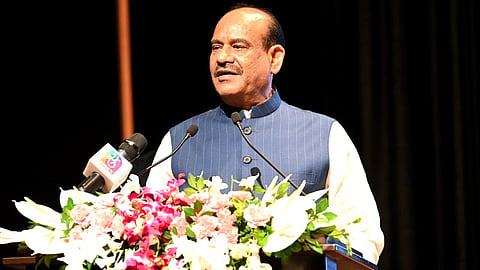

MANESAR: Ahead of the Monsoon Session of Parliament, Lok Sabha Speaker Om Birla on Thursday claimed that the 18th Lok Sabha has seen a rise in productivity and more meaningful debate due to a noticeable reduction in disruptions. He stated that democracy thrives through "dialogue, patience, and depth of discussion."
Speaking at a first-of-its-kind national conference of Chairpersons of Urban Local Bodies, organised by the Lok Sabha in collaboration with the Haryana Legislative Assembly, Birla, who also inaugurated the event as chief guest, remarked that frequent disruptions — once a recurring feature — have significantly reduced in the Indian Parliament, thereby enhancing productivity and the quality of debate on the House floor.
He further noted that the Lok Sabha has increasingly conducted late-night sessions and held long-duration debates, reflecting a more mature and responsible democratic culture. “The members used to get placards to disrupt the proceedings of the House. The 17th Lok Sabha (2019–2024) was no different, but change was visible in the 18th Lok Sabha,” he said, urging all political parties to strive for fewer disruptions during House proceedings.
Birla also cautioned that the public would "teach a lesson" to political parties that persist in disrupting proceedings.
Stressing the role of urban local bodies (ULBs) in reinforcing democracy at the grassroots, Birla urged them to adopt structured procedures, including regular sittings, robust committee systems, and citizen engagement mechanisms, to bolster participatory governance in Indian cities.
The two-day national conference, which commenced on July 3 at the International Centre for Automotive Technology (ICAT), marked a landmark initiative aimed at exploring how urban local bodies can contribute to constitutional democracy and nation-building through participatory governance frameworks.
“There is a need to consider the importance of incorporating proven democratic practices such as Question Hour and Zero Hour in urban local bodies and other local governance institutions, as such provisions in Parliament have played a vital role in holding the executive accountable and raising public concerns systematically,” Birla said.
Lamenting that irregular or ad-hoc municipal meetings weaken the effectiveness of local governance, Birla advocated for regular and structured sessions, standing committees, and open civic consultations.
“As in Parliament, ULBs too must shun disruptive behaviour and focus on constructive and inclusive discussions,” he suggested, citing the example of the Lok Sabha, where reduced protest activity and placard-waving have led to significantly higher productivity, improving public perception and enabling better lawmaking.
He further emphasised that, with over 600 million people projected to reside in urban areas by 2030, the scale and scope of urban governance must expand and adapt accordingly.
Birla also highlighted the crucial, everyday impact that ULBs have on the lives of citizens, particularly through their responsibilities in essential civic areas such as infrastructure development, sewage and sanitation, waste management, road construction, and pollution control.
He praised the increasing participation of women in governance, noting that in many urban local bodies, women’s representation has approached nearly 50%.
Birla urged delegates to ensure that plans are effectively implemented on the ground, pointing out that India, as the mother of democracy, has long embraced local self-governance, from Gram Sabhas to urban municipalities — as part of its cultural and civic tradition.
He encouraged participants to engage actively with citizens, commit to long-term policy planning, and strive for continual improvements in municipal functioning. He also advised ULBs to anticipate urban challenges, invest in capacity-building, and institutionalise knowledge sharing, so that India’s cities remain resilient, inclusive, and competitive on the global stage.
Haryana Chief Minister Nayab Singh Saini also addressed the gathering, highlighting the state’s ongoing work on the Panchgram project aimed at establishing a new township to accommodate a population of 74 lakh people.
To open the conference, Speaker of the Haryana Vidhan Sabha, Harvinder Kalyan, welcomed all guests and delegates.